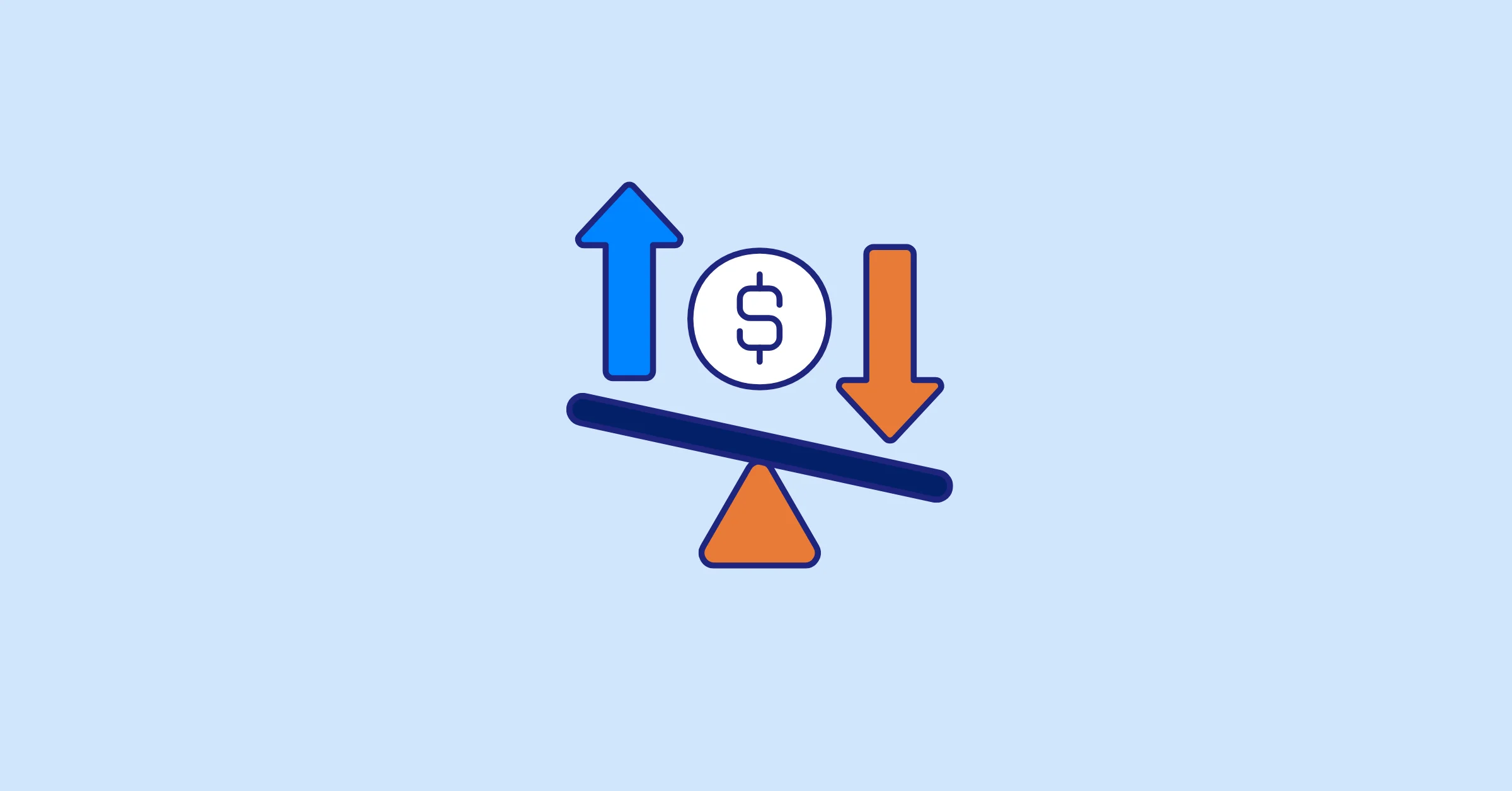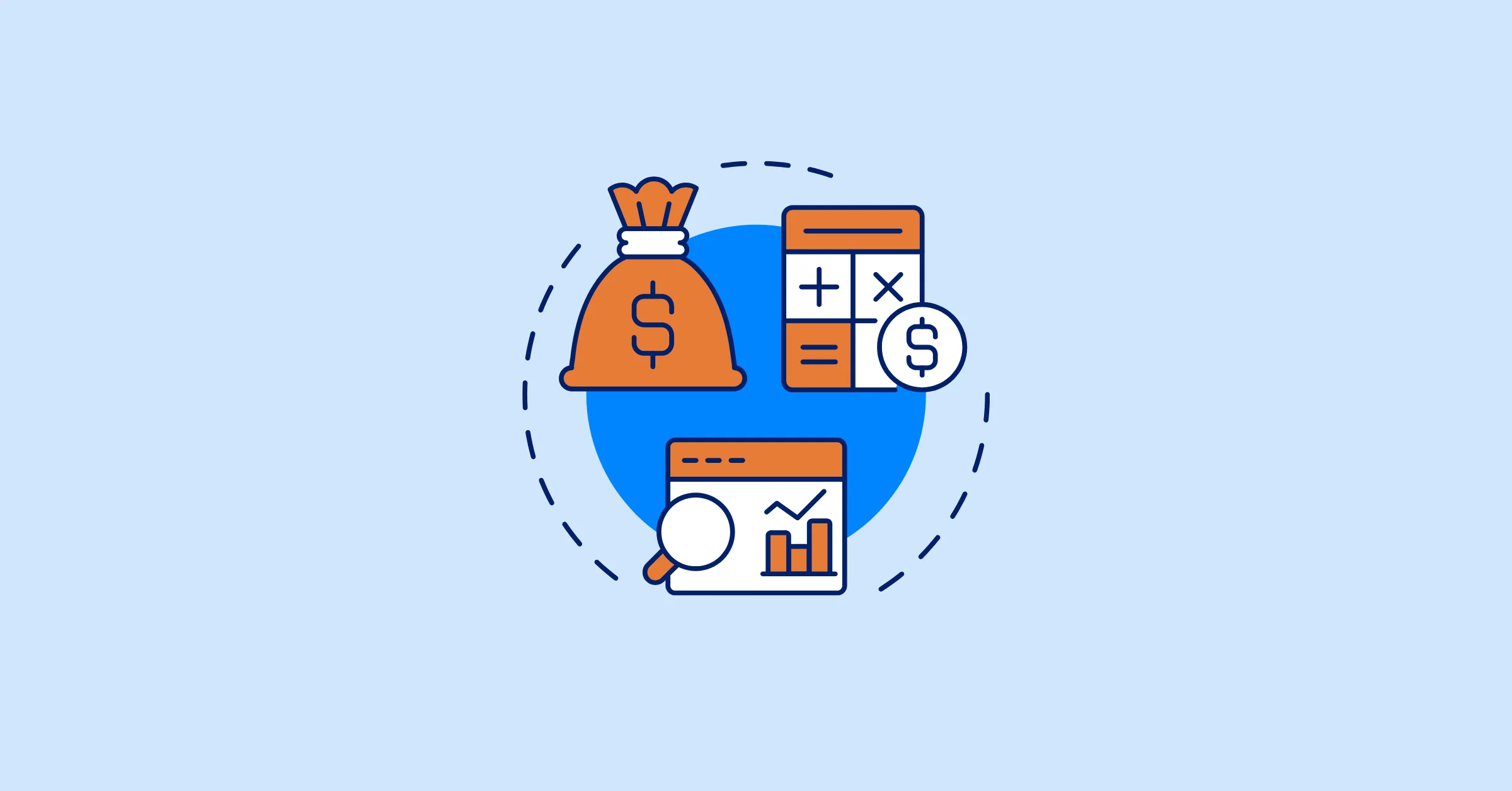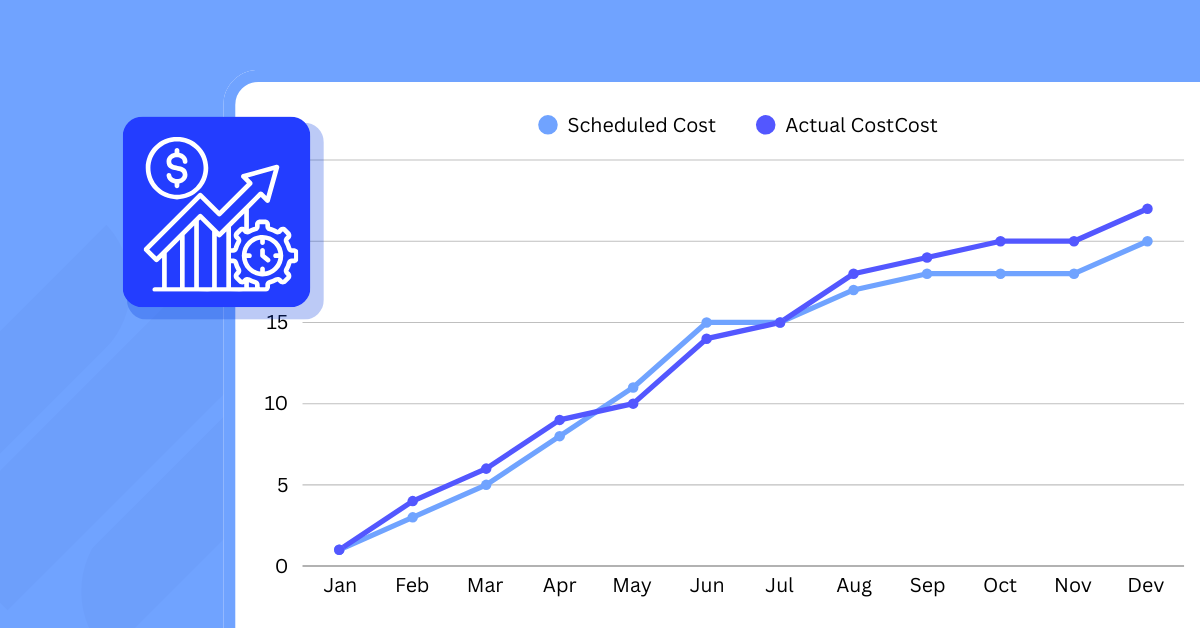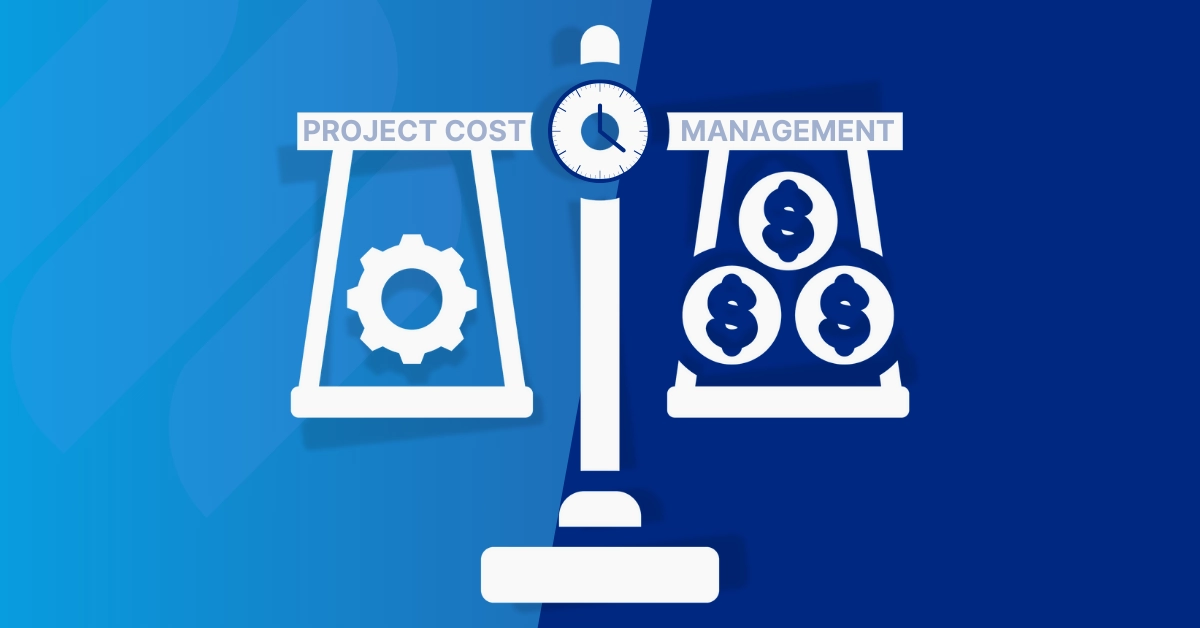Project Cost Management 101: A Beginner's Guide to Budgeting and Control
Learn the essentials of project cost management! This beginner's guide covers planning, estimating, budgeting, and controlling project costs to prevent overruns. Master project cost management basics.
Ever kicked off a project brimming with enthusiasm, only to watch the budget spiral faster than a dropped piggy bank down a spiral staircase? You're not alone. Managing money is tricky in everyday life, and it gets exponentially more complex when tied to project deadlines, resources, and shifting goals. This is where project cost management steps in – it’s not just about counting pennies; it’s the strategic practice of planning, estimating, budgeting, financing, funding, managing, and controlling costs so the project can be completed within the approved budget. Getting a grip on project cost management is fundamental to project success, preventing those dreaded budget blowouts and ensuring your ventures deliver value without breaking the bank.
This guide will walk you through the essentials of project cost management, breaking down complex ideas into simple, actionable steps for beginners. Effective project cost management is a cornerstone of successful project management.
Key Takeaways
- Understand the Core Processes: Learn the four essential phases of project cost management: Planning, Estimating, Budgeting, and Controlling costs. Mastering these is key to effective project cost management.
- Master Budgeting Techniques: Discover different methods for estimating project costs accurately and how to aggregate these into a realistic project budget, including contingency planning. This forms the basis of sound project cost management.
- Implement Cost Control: Grasp the importance of actively monitoring project spending against the budget, identifying variances, and taking corrective action using techniques like Earned Value Management (EVM). Continuous control is vital for project cost management.
- Leverage Tools for Success: Recognize how dedicated tools, like the upcoming TaskFord platform, can streamline project cost management by integrating planning, tracking, and reporting.
Why is Project Cost Management So Darn Important?
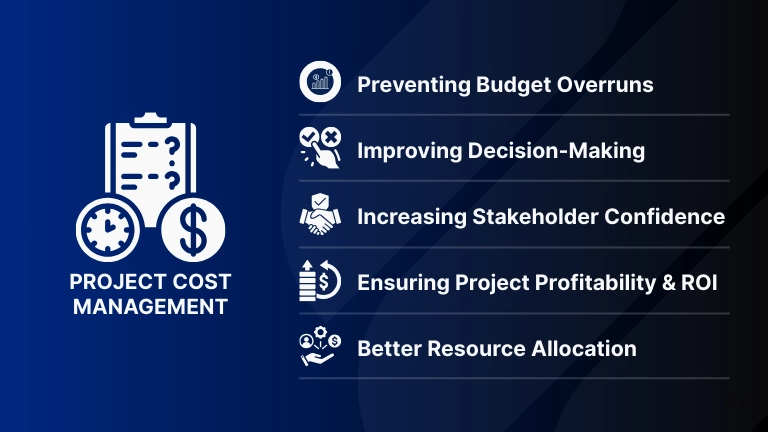
Let's be blunt: money matters. In the project world, failing to manage costs effectively can lead to a cascade of problems, and project cost management helps:
- Preventing Budget Overruns: This is the most obvious benefit. Solid project cost management helps you anticipate expenses and keep spending aligned with the plan, preventing nasty surprises and frantic searches for extra funding. Without it, you risk running out of money before the project is finished.
- Improving Decision-Making: Accurate cost data empowers project managers and stakeholders to make informed decisions. Should we pursue a specific feature? Can we afford a particular resource? Effective project cost management provides the financial context needed to answer these questions confidently.
- Increasing Stakeholder Confidence: Nothing builds trust like delivering a project on budget. Good project cost management demonstrates competence, fiscal responsibility, and reliable execution, keeping stakeholders happy and supportive. Conversely, poor project cost management erodes trust quickly.
- Ensuring Project Profitability & ROI: For many projects, especially commercial ones, staying within budget is directly linked to profitability and achieving the desired Return on Investment (ROI). Diligent project cost management safeguards the project's financial viability.
- Better Resource Allocation: Understanding costs helps optimize resource planning. Knowing the cost implications of using certain team members, equipment, or materials allows for more strategic allocation, ensuring resources are used efficiently. This is a critical part of overall resource management.
In essence, project cost management acts as the financial compass for your project, guiding it safely through potentially turbulent economic waters. It's an indispensable part of holistic project management.
The Core Processes of Project Cost Management
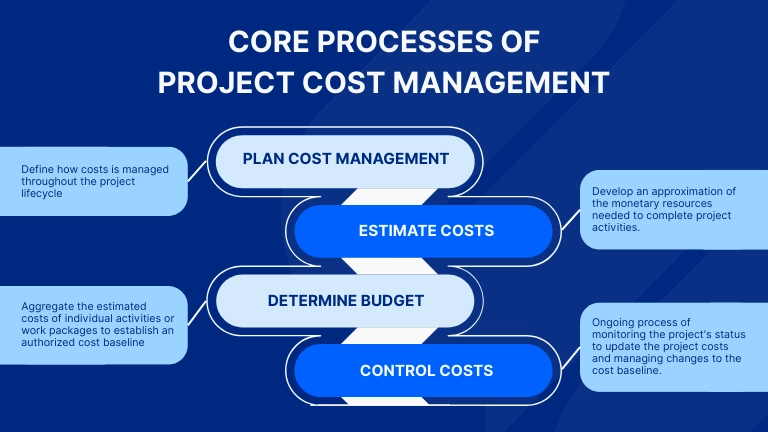
According to established frameworks like the Project Management Institute's (PMI) PMBOK® Guide, project cost management typically involves four key process groups. Let's break them down:
1. Plan Cost Management
-
What it is: This initial phase is all about defining how you'll manage costs throughout the project lifecycle. It’s like creating the rulebook for all financial activities related to the project. Strong project planning foundations are laid here.
-
Key Activities:
- Defining units of measure (e.g., hours, days, currency).
- Setting levels of precision and accuracy for estimates.
- Establishing control thresholds (how much variance is acceptable before action is needed).
- Defining reporting formats and frequency.
- Identifying the project cost management methodologies and tools to be used.
-
Output: The main output is the Cost Management Plan. This document becomes part of the overall project management plan and guides all subsequent project cost management activities.
2. Estimate Costs
-
What it is: Here, you develop an approximation of the monetary resources needed to complete project activities. It’s about figuring out "how much will this really cost?" This requires detailed project cost management analysis.
-
Key Activities & Techniques:
- Analogous Estimating: Using historical data from similar past projects. Quick but less accurate. Relies on good record-keeping from previous project cost management efforts.
- Parametric Estimating: Using statistical relationships between historical data and other variables (e.g., cost per square foot in construction). More accurate if the underlying data and model are solid.
- Bottom-Up Estimating: Estimating the cost of individual work packages or tasks and rolling them up to get a project total. Most accurate but also most time-consuming. Requires detailed task management. Accurate project cost management often relies on this.
- Three-Point Estimating: Considering optimistic (O), pessimistic (P), and most likely (M) estimates to account for uncertainty (often using formulas like PERT: (O + 4M + P) / 6).
-
Inputs: This relies heavily on the scope baseline, project schedule, resource planning details (who/what is needed), risk register, and historical data. Accurate project cost management hinges on quality inputs.
3. Determine Budget
-
What it is: This involves aggregating the estimated costs of individual activities or work packages to establish an authorized cost baseline. This baseline is the approved version of the project budget against which project execution is monitored. This is a crucial step in project cost management.
-
Key Activities:
- Summing up the cost estimates from the previous step.
- Adding Contingency Reserves: Funds allocated for identified risks ("known unknowns"). These are part of the cost baseline and managed by the project manager. Effective project cost management includes planning for uncertainty.
- Adding Management Reserves: Funds set aside for unforeseen work or risks ("unknown unknowns"). These are not typically part of the cost baseline and usually require formal approval to use. This is part of overall budget management .
-
Output: The Cost Baseline (the time-phased budget) and Project Funding Requirements. The baseline becomes the benchmark for project cost management control.
4. Control Costs
-
What it is: This is the ongoing process of monitoring the project's status to update the project costs and managing changes to the cost baseline. It's about keeping the financial train on the tracks throughout the project. This is where active project cost management happens daily.
-
Key Activities:
-
Monitoring Performance: Tracking actual costs incurred against the work being done. Accurate time tracking and timesheet data are invaluable here.
-
Variance Analysis: Comparing planned costs (baseline) to actual costs and identifying differences (variances). Is the project over or under budget? Why? This is core to project cost management.
-
Earned Value Management (EVM): A powerful technique that integrates scope, schedule, and cost performance. Key metrics include:
- Planned Value (PV): Budgeted cost for work scheduled.
- Earned Value (EV): Budgeted cost for work actually completed.
- Actual Cost (AC): Actual cost incurred for work completed.
- Schedule Variance (SV = EV - PV): Are we ahead or behind schedule?
- Cost Variance (CV = EV - AC): Are we over or under budget?
- Schedule Performance Index (SPI = EV / PV): Schedule efficiency.
- Cost Performance Index (CPI = EV / AC): Cost efficiency. (For a deeper dive into EVM, resources like the Project Management Institute (PMI) website are excellent). Effective project cost management often utilizes EVM.
-
-
Forecasting: Predicting future project performance based on current data (e.g., Estimate at Completion - EAC).
-
Change Management: Processing changes that impact the budget through a formal change control system. Uncontrolled changes are a major threat to project cost management.
Common Challenges in Project Cost Management (and How to Dodge Them)
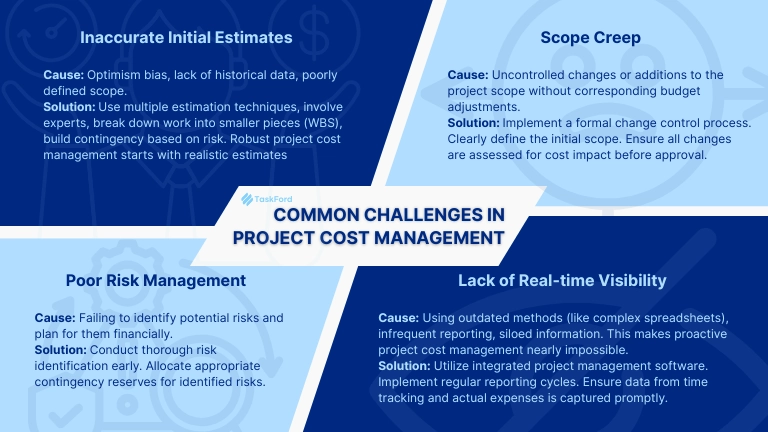
Even with the best intentions, project cost management can hit roadblocks. Here are common culprits and potential solutions:
-
Challenge: Inaccurate Initial Estimates
- Cause: Optimism bias, lack of historical data, poorly defined scope.
- Solution: Use multiple estimation techniques, involve experts, break down work into smaller pieces (WBS), build contingency based on risk. Robust project cost management starts with realistic estimates.
-
Challenge: Scope Creep
- Cause: Uncontrolled changes or additions to the project scope without corresponding budget adjustments.
- Solution: Implement a formal change control process. Clearly define the initial scope. Ensure all changes are assessed for cost impact before approval. Disciplined scope management is vital for project cost management.
-
Challenge: Poor Risk Management
- Cause: Failing to identify potential risks and plan for them financially.
- Solution: Conduct thorough risk identification early. Allocate appropriate contingency reserves for identified risks. Integrate risk management with project cost management.
-
Challenge: Lack of Real-time Visibility
- Cause: Using outdated methods (like complex spreadsheets), infrequent reporting, siloed information. This makes proactive project cost management nearly impossible.
- Solution: Utilize integrated project management software. Implement regular reporting cycles. Ensure data from time tracking and actual expenses is captured promptly. Tools like Smartsheet or ClickUp aim to help here, but integration across all aspects is key.
Tools and Techniques for Effective Project Cost Management
While you can manage project costs with spreadsheets and sheer willpower, specialized tools make project cost management significantly easier and more effective.
-
Project Management Software: Modern platforms offer integrated solutions. Look for software that combines:
- Project Planning & Task Management: Defining scope, WBS, and tasks which are inputs for cost estimation. Good task management underpins good cost tracking.
- Resource Planning & Management: Assigning resources (people, equipment) and their associated costs. Essential for accurate resource planning costs.
- Time Tracking & Timesheets: Capturing actual effort spent on tasks, which translates directly to labor costs – a major component of many project budgets. Accurate time tracking via timesheet submission is crucial for cost control.
- Budgeting & Cost Tracking: Setting baselines, tracking actual expenses against tasks/phases, calculating variances.
- Reporting & Dashboards: Providing real-time visibility into cost performance (like EVM metrics), often linking with portfolio management views for organizational oversight. Improves time management by reducing manual report creation.
-
Spreadsheets (e.g., Excel, Google Sheets): Good for basic calculations and small projects. However, they lack integration, automation, real-time updates, and robust reporting features needed for complex project cost management. Prone to errors and difficult to scale.
This is precisely where TaskFord aims to excel. We are building TaskFord as a comprehensive project management solution designed with seamless integration in mind. Our goal is to provide robust features for project management, task management, cost management, resource planning, time tracking, and timesheet management all in one platform. Imagine effortlessly linking time logged on a task directly to your project budget, getting real-time cost variance reports, and having clear visibility – that’s the future we envision for streamlined project cost management with TaskFord. TaskFord is being built ground-up to tightly integrate these specific core functionalities for superior budget management and control.
Conclusion: Taking Control of Your Project Finances
Project cost management isn't just an administrative chore; it's a critical discipline that underpins project success. By diligently planning how costs will be managed, carefully estimating expenses, establishing a realistic budget baseline, and continuously controlling costs throughout the project lifecycle, you significantly increase your chances of delivering on time and, crucially, on budget.
Remember the four pillars: Plan, Estimate, Budget, and Control. Embrace techniques like EVM where appropriate, be vigilant against scope creep, and leverage the right tools to gain visibility and streamline the process. Mastering project cost management takes practice, but the payoff – successful projects, happy stakeholders, and less financial stress – is well worth the effort. Effective project cost management is achievable with the right approach and support. Consistent application of project cost management principles is key. Think of project cost management as your project's financial guardian angel.
Ready to Take the Guesswork Out of Project Cost Management?
Feeling overwhelmed by spreadsheets and budget tracking headaches? TaskFord is being built to simplify your project finances! Our upcoming platform will integrate project planning, task management, resource allocation, time tracking, and powerful cost management features into one intuitive system.
Be among the first to experience effortless project cost control!

Making work simpler,
smarter, and more connected
Join our waitlist and be notified first.

Related Blog
Subscribe for Expert Tips
Unlock expert insights and stay ahead with TaskFord. Sign up now to receive valuable tips, strategies, and updates directly in your inbox.

